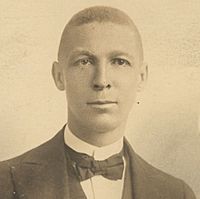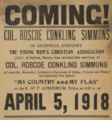Roscoe Simmons facts for kids
Quick facts for kids
Roscoe Simmons
|
|
|---|---|

Simmons pictured in 1910
|
|
| Born |
Roscoe Conkling Simmons
June 20, 1881 Greenview, Mississippi, United States
|
| Died | April 27, 1951 (aged 69) |
| Nationality | American |
| Alma mater | Tuskegee Institute |
| Occupation | Journalist, activist |
| Political party | Republican |
| Relatives | Booker T. Washington (uncle) Margaret Murray Washington (aunt) Alice Carter Simmons (sister) |
Roscoe Conkling Simmons (born June 20, 1881 – died April 27, 1951) was an important American speaker, writer, and political leader. He was the nephew of the famous leader Booker T. Washington. Roscoe wrote a newspaper column from Washington, D.C. about issues important to African Americans. He also had a big impact on the Republican Party.
Contents
Growing Up and Education
Roscoe Simmons was born in Greenview, Mississippi in 1881. He was named after a well-known politician, Roscoe Conkling, from New York. His sister, Alice Carter Simmons, became a musician. Their father was the principal of a school for African Americans in Hollandale, Mississippi. Roscoe grew up in Aberdeen, Mississippi.
When Roscoe was 12, his uncle, Booker T. Washington, helped him get a job. He worked as an office boy for Mark Hanna, a rich businessman and friend of President William McKinley. This early experience with Hanna started Roscoe's long connection with the Republican Party. He stayed close friends with the powerful Hanna family throughout his life. Roscoe later graduated from the Tuskegee Institute.
His Career as a Journalist and Speaker
Roscoe Simmons started his career as a reporter for the Pensacola Daily Press. He then moved to The Chicago Defender, a newspaper that focused on African-American issues. His columns became very popular. He was the highest-paid employee at the newspaper.
During World War I, Roscoe reported from Europe. He wrote about the experiences of African-American soldiers in the U.S. Army. During this time, he earned the nickname "the Colonel."
Speaking Across the Nation
The U.S. Military Intelligence Division wanted to support patriotic Black leaders. They asked Roscoe Simmons to give speeches across the country. Major Walter Loving helped manage his speaking tours. Roscoe quickly became known for his amazing speaking skills. Even William Jennings Bryan, a famous speaker himself, called Roscoe "one of the great orators of the world." Advertisements called him "America's greatest orator."
In one of his famous speeches, "My Country and My Flag," Roscoe said:
We have but one flag, the flag that set us free. Its language is our only tongue, and no hyphen bridges or qualifies our loyalty. Today the nation faces danger from a foreign foe, treason skulks and stalks up and down our land, in dark councils intrigue is being hatched. Woodrow Wilson is my leader. What he commands me to do I shall do. Where he commands me to go I shall go. If he calls me to the colors I shall not ask whether my colonel is black or white. I shall be there to pick out no color except the white of the enemy's eyes.
He was also a member of the Colored Knights of Pythias, a fraternal organization. He gave the main speech at their big meeting in 1929.
In the 1920s, Roscoe worked as the editor of The Chicago Defender. He also led the Lincoln League and the Speaker's Bureau for the Western Division. In 1936, he passed the bar exam and became a lawyer.
His Role in the Republican Party
Roscoe Simmons was a Republican his entire life. He played a key role in keeping African-American voters loyal to the Republican Party. This was from the early 1900s until the Great Depression. He was part of a group called the "Old Guard." This group of Black party insiders had a lot of influence behind the scenes. Other members included Perry Wilbon Howard and Robert Reed Church. In 1936, he helped replace an all-white group from South Carolina at the national convention with a mixed-race group.
Roscoe was chosen three times to be a delegate at the Republican National Convention. In 1932, he supported Herbert Hoover to be the candidate for President of the United States. A newspaper reported that after his speech, many important people rushed to congratulate him.
In 1936, Roscoe was made the head of the Negro Speakers Bureau of the Republican Party. This group included important African-American Republican activists.
Roscoe ran for political office twice but did not win. In 1929, he ran against Oscar Stanton De Priest for a seat in the U.S. House of Representatives. In 1933, he ran for the Illinois State Senate.
Writing for the Chicago Tribune
From 1943 to 1946, Roscoe Simmons wrote articles for the Chicago Tribune. These articles were about issues important to African Americans. In 1946, he started writing a column called The Untold Story. This column was based in Washington, D.C. It shared stories of successful African Americans across the U.S. He continued writing The Untold Story for the Tribune until he passed away in 1951. His topics included Fisk University, a historically Black college, and the Republican Party.
In 1951, Roscoe Simmons was allowed into the press galleries of the Senate and House of Representatives. He was representing the Chicago Tribune. He was only the third African American to be given this special access.
His Personal Life
Roscoe Simmons was married twice. He had three sons with his first wife: William, Thomas, and Roscoe. His second wife, Althea Amaryllis Merchant, was part of the Alpha Kappa Alpha sorority. She later became a regional director for the sorority.
Roscoe was the godfather to Walter Loving, Jr., the son of his manager, Walter Loving. Roscoe's letters and personal papers are kept at Harvard University. His oldest son, William, graduated from Harvard.
In 1936, Roscoe Simmons became a member of the Catholic Church. This was noted by a close friend.
Images for kids
 | Mary Eliza Mahoney |
 | Susie King Taylor |
 | Ida Gray |
 | Eliza Ann Grier |


